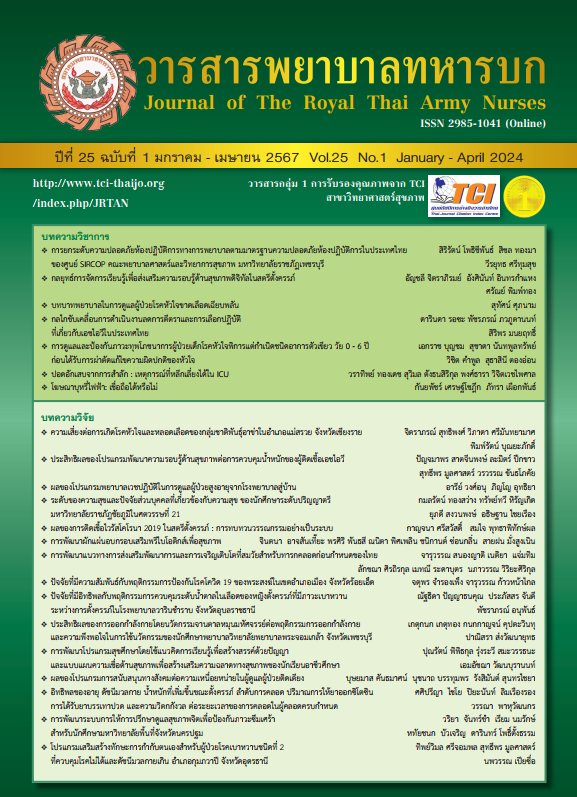The Effects of Gamification on Health Literacy in School-aged Children with Thalassemia
Keywords:
Thalassemia Children, Health Literacy, Online-game, Gamification, Genetic diseaseAbstract
This is quasi-experimental research aimed to study the effects of an online game on health literacy of school-age children with thalassemia, including knowledge, decision making and healthcare management regarding continuing care. 42 school-age children with Beta Thalassemia and Hemoglobin E deficiency were recruited based on inclusion criteria and equally organised into control and experiment group by math pair sampling. The instruments of this study were Thalassemia online games and health literacy assessments validated by 3 experts with validity (IOC) of each item ranging from 0.6-1.0, and reliability (KR-20) = 0.8. The research was conducted in Thalassemia clinic for 6 months. Data were analysed by using paired t-test and independent t-test. The results found that gamification significantly promotes health literacy in school-age children with Thalassemia at 0.05 level. This result also confirmed that the blood iron levels from the experimental group were continuously decreased after using online games.
Recommendation: The learning outcomes regarding decision making experiences should be extensively focused on the future study.
Downloads
References
Puinukroh R. Quality of life in children with thalassemia and associated factors in Nong Khai Hospital. Mahasarakham Hospital Journal. 2022;19(2): 113-26. (in Thai)
Tachavijitjaru C., Health Literacy: A key Indicator towards Good Health Behavior and Health Outcomes. Journal of The Royal Thai Army Nurses. 2018;19(Sub): 1-11. (in Thai)
Nutbeem D. The evolving concept of Health Literacy. Social Science and Medicine. 2008;67(12): 2072-8.
Kasgari KA. et al., Health Literacy Measurement in Childhood: A Systematic Review. Journal of Pediatric Review. 2020; 8(3): 163-73.
Ingram RR. & Kautz DD. Creating Win-Win Outcomes for Health Literacy. Medsurg Nursing. 2018; 27(2): 132-4.
Clark KR. Learning Theories: Cognitivism. Radiologic Technology Journal. 2018; 90(2): 176-9.
Teerarungsikul N. & Sananreangsak S. Self-Management Experiences of Children with Thalassemia. The Journal of Faculty of Nursing Burapha University. 2015; 23(4): 48-60. (in Thai)
Kapp K., Lucas B. & Rich M. The Gamification of Learning and Instruction: Game-based Methods and Strategies for Training and Education. USA: John Wiley & Sons. 2012.
Wilson AS. & McDonagh JE. A Gamification Model to Encourage Positive Healthcare Behaviours in Young People with Long Term Conditions. EAI Endorsed Transactions on Serious Games Journal.2014; 1(2): 1-10.
Fijačko N, et al. Gamification in nursing: a literature review. Obzornik zdravstvene nege Journal, 2020; 54(2): 133-52.
Tungsakul J. Development of a Learning Management Model Based on the Gamification Concept to Enhance Collaborative ProblemSolving Competency among Nursing Students. (Thesis). Bangkok: Srinakharinwirot University. 2020. (in Thai)
Huang WH. & Soman D. A Practitioner’s guide to gamification of education. Rotman School of Management University of Toronto. (2013).
Castrol TC. and Gonçalves SL. The use of gamification to teach in the nursing field. Brazilian nursing journals [Internet]. 2018; 71(3):1038-45.
Blake H. Using Technology in Health Promotion Interventions. 1st edition. Nottingham: Nova Science Publishers, Inc. 2008.
Rafeezadeh E. et al., Effect of an Educational Video Game for Diabetes Self-management on Adherence to a Self-care Regimen in Children with Type 1 Diabetes. Evidence Based Care Journal. 2019; 9(1): 74-83.
Sanitlou N., Woraponsatorn T. and Naphaarrak Y. Sample size calculation using G*Power Program. Journal of Suvarnabhumi Institute of Technology. 2019; 5(1): 496-507. (in Thai)
Downloads
Published
How to Cite
Issue
Section
License
Copyright (c) 2024 Journal of The Royal Thai Army Nurses

This work is licensed under a Creative Commons Attribution-NonCommercial-NoDerivatives 4.0 International License.
บทความหรือข้อคิดเห็นใดใดที่ปรากฏในวารสารพยาบาลทหารบกเป็นวรรณกรรมของผู้เขียน ซึ่งบรรณาธิการหรือสมาคมพยาบาลทหารบก ไม่จำเป็นต้องเห็นด้วย
บทความที่ได้รับการตีพิมพ์เป็นลิขสิทธิ์ของวารสารพยาบาลทหารบก
The ideas and opinions expressed in the Journal of The Royal Thai Army Nurses are those of the authors and not necessarily those
of the editor or Royal Thai Army Nurses Association.






